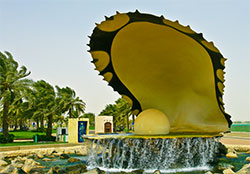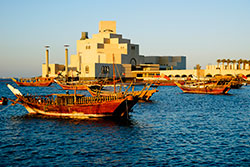
The State of Qatar is one of the most exciting countries in the Middle East, with the population predominantly young, the economy expanding, and the pace of modernization quickening every year.
A member of the six-nation Gulf Cooperation Council, Qatar has hosted meetings of the World Trade Organization and the Organization of the Islamic Conference. It is the home of Al-Jazeera Satellite Channel and of the Qatar Foundation's Education City, one of the most ambitious and far-reaching centers for education and research in the Middle East.
A peninsula of some 5,000 square miles, Qatar has a landscape of sand dunes in the south and flat, rocky desert with scattered cultivation in the north. The climate is mild and pleasant in winter with occasional rainfall, while the summers are hot and frequently humid.

For centuries, economic activity centered on camel breeding, fishing and pearl diving. In the twentieth century, the economy was transformed by the discovery of oil and, later on, of vast reserves of gas off the northeast coast. Qatar has the largest non-associated gas field yet discovered, and is now a major exporter of liquefied natural gas and condensates. The country is forecast to have the highest per capita income in the world within the next few years.
With economic prosperity came the development of a modern infrastructure: transport and telecommunication links, schools, hospitals and public health clinics. The University of Qatar was founded in 1973. When the Father Emir, H.H Sheikh Hamad Bin Khalifa Al-Thani assumed power in 1995, the pace of change accelerated:
- Industrial complexes expanded, and there was a boom in the construction of housing, hotels, shopping complexes and sports facilities. Qatar hosted the Asian Games in 2006.
- The first elections were held in 1999 for members of the Central Municipal Council (CMC), which has an advisory and monitoring role. Women could both vote and stand as candidates, and in 2003 the first woman member of the CMC took her seat.
- A constitution guaranteeing a number of important rights was adopted following a referendum, the first in the country's history, in 2003.
- Qatar's first woman Minister, H.E. Sheikha Al-Mahmoud was appointed Minister of Education in 2003. Other Qatari women hold posts in international (e.g. U.N.), regional and national organizations.
- Educational reform became a priority. Qatar has had a major overhaul of the schools system and curriculum, under the aegis of RAND-Qatar Policy Institute.
This culture of innovation has continued under the current Emir, H.H Sheikh Tamim Bin Hamad Al-Thani.
A wealth of information about Qatar’s history, government and politics, population, culture, religion, economy, and much more is available on the Internet. A broad overview, such as that provided in the Wikipedia entry on Qatar, can be a useful launching point for a virtual exploration of the country.
Useful Information
Time Zone
Qatar time is three hours ahead of Greenwich Mean Time and 7/8 hours ahead of New York EST/DST. There is no daylight savings time in Qatar.
Climate
Qatar has a pleasant climate nine months of the year with hot summers and relatively warm winters. In the summer, the temperature ranges between 77-120 degrees Fahrenheit with high humidity. The temperature is eased by air conditioning in the vast majority of homes and workplaces. During the summer, most people take holidays or spend more time indoors. Sports, entertainment and leisure facilities are available in a vast array of recreation areas including clubs and hotels.
Winter is dry and resembles early fall in North America. Temperatures range from 50-75 degrees Fahrenheit, with the cooler temperatures prevailing in the evenings. Rainfall is minimal, averaging three inches per year. Sand storms, haze and dust storms are common.
Currency
The Qatari Riyal (QR) is the currency of the country and $1 U.S. purchases QR3.65 (fixed rate). Most major establishments accept major credit cards; some will accept U.S. Dollars.